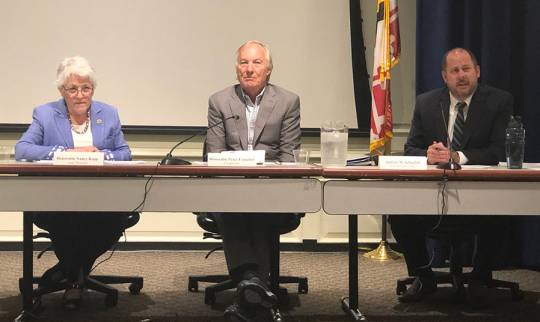 Maryland Comptroller Peter Franchot, center, and State Treasurer Nancy Kopp, left, listen as Bureau of Revenue Estimates Director Andrew Schaufele explains the revised revenue projections for fiscal year 2020 during a Board of Revenue Estimates meeting in Annapolis, Maryland, on Sept. 19, 2019.
Maryland Comptroller Peter Franchot, center, and State Treasurer Nancy Kopp, left, listen as Bureau of Revenue Estimates Director Andrew Schaufele explains the revised revenue projections for fiscal year 2020 during a Board of Revenue Estimates meeting in Annapolis, Maryland, on Sept. 19, 2019.ANNAPOLIS (September 20, 2019)—The Maryland Board of Revenue Estimates voted unanimously Thursday to increase the state's projected revenues for the current fiscal year by just under $130 million, but cautioned that the uptick "is not indicative of long-term economic growth."
The new estimate, a 2.7% increase compared to the last projections in March, is really a reflection of a strong tax year in 2018, Maryland Comptroller Peter Franchot noted Thursday during the board's meeting. Franchot, Maryland Treasurer Nancy Kopp and Budget and Management Secretary David Brinkley make up the Board of Revenue Estimates.
The board also set the first official projection for fiscal year 2021 at approximately $19.1 billion, which is a 1.9% increase over prior planning figures, said Bureau of Revenue Estimates Director Andrew Schaufele during the meeting.
Schaufele told Capital News Service after the meeting that the updated projections are a "mix of good and bad." He pointed to the "writedown in our wage growth outlook" as a point of concern for the future.
Franchot said that three top industries—the federal government, information and financial services—"have contracted while lower-wage industries are growing."
"While we may be experiencing the longest-recorded period of economic growth at 122 consecutive months," Franchot added, "the tight labor market is not generating the wage growth that it has in the past."
Alan Brody, Franchot's spokesman, said after the meeting that with the long period of growth, "history dictates" the possibility of an economic "bubble burst" in the future.
Franchot noted "stronger than expected" capital gains reported last month, as well as an uptick in online sales taxes collected after a U.S. Supreme Court ruling.
Franchot, a Democrat, also spoke of other concerns for the future of the economy, including "reckless and erratic trade policy from Washington."
Brinkley added during the meeting that "revenue growth may not be as rosy in future fiscal years."
At the last Board of Revenue Estimates meeting in March, the board voted to decrease the revenue projection for fiscal year 2020—which runs July 1, 2019, through June of 2020—by $130.5 million, or 0.7%, according to a news release.
The decrease was "largely the result of taxpayer uncertainty and changed spending habits in the wake of the Tax Cuts and Jobs Act," the release notes. The act, which became a law in late 2017, amended the Internal Revenue Code to reduce tax rates.
Franchot also spoke of the possibility of a recession at the March meeting.
"There is widespread consensus among experts, including our own Bureau of Revenue Estimates, that we can expect an economic downturn in the next several years," Franchot said, according to the news release. "So the state of Maryland must continue to prepare for the inevitable, by putting as much money aside in our Rainy Day Fund to prevent the types of drastic budget cuts, furloughs, and tax increases that we witnessed during the Great Recession."
Schaufele added after Thursday's meeting, "To some degree, we're living on borrowed time here."


